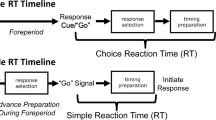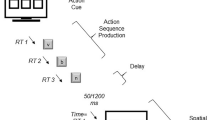Abstract
Previous findings from experiments involving anticipation-timing tasks have indicated that a point in time may exist after which a participant is committed to producing a pre-programmed movement. For example, if a “stop” signal is given too long after a “go” signal but prior to movement initiation, the response is often still produced. It has been suggested that a startling stimulus may act to elicit a pre-programmed response in reaction time (RT) tasks without involvement of the cerebral cortex (Valls-Solé et al. 1999). The present experiment employed a startling stimulus to investigate the temporal course of motor preparation during a stop-signal anticipation-timing task. Participants timed a key release coincident with the sweep of a clock hand reaching a target. On some trials, the clock hand stopped prior to reaching the target (meaning participants were to refrain from responding), which was accompanied by either a startling acoustic stimulus (124 dB) or control stimulus (82 dB). Results from startle trials indicate that while some advance preparation of motor circuits was evident, subcortical pre-programming and storage of the motor command in circuits common to the voluntary and startle response pathways was not completed well in advance of response production.



Similar content being viewed by others
References
Abel K, Waikar M, Pedro B, Hemsley D, Geyer M (1998) Repeated testing of prepulse inhibition and habituation of the startle reflex: a study in healthy human controls. J Psychopharmacol 12:330–337
Brown P, Rothwell JC, Thompson PD, Britton TC, Day BL, Marsden CD (1991) New observations on the normal auditory startle reflex in man. Brain 114:1891–1902
Buford JA, Davidson AG (2004) Movement-related and preparatory activity in the reticulospinal system of the monkey. Exp Brain Res 159:284–300
Carlsen AN, Chua R, Inglis JT, Sanderson DJ, Franks IM (2003a) Startle response is dishabituated during a reaction time task. Exp Brain Res 152:510–518
Carlsen AN, Hunt MA, Inglis JT, Sanderson DJ, Chua R (2003b) Altered triggering of a prepared movement by a startling stimulus. J Neurophysiol 89:1857–1863
Carlsen AN, Chua R, Inglis JT, Sanderson DJ, Franks IM (2004a) Can prepared responses be stored subcortically? Exp Brain Res 159:301–309
Carlsen AN, Chua R, Inglis JT, Sanderson DJ, Franks IM (2004b) Prepared movements are elicited early by startle. J Mot Behav 36:253–264
Carlsen AN, Dakin CJ, Chua R, Franks IM (2007) Startle produces early response latencies that are distinct from stimulus intensity effects. Exp Brain Res 176:199–205
Castellote JM, Kumru H, Queralt A, Valls-Solé J (2007) A startle speeds up the execution of externally guided saccades. Exp Brain Res 177:129–136
Cordo P, Carlton L, Bevan L, Carlton M, Kerr GK (1994) Proprioceptive coordination of movement sequences: role of velocity and position information. J Neurophysiol 71:1848–1861
Coxon JP, Stinear CM, Byblow WD (2006) Intracortical inhibition during volitional inhibition of prepared action. J Neurophysiol 95:3371–3383
Geyer MA, Braff DL (1982) Habituation of the blink reflex in normals and schizophrenic patients. Psychophysiology 19:1–6
Henry FM, Harrison JS (1961) Refractoriness of a fast movement. Percept Motor Skills 13:351–354
Keele SW (1968) Movement control in skilled motor performance. Psych Bull 70:387–403
Klapp ST (2003) Reaction time analysis of two types of motor preparation for speech articulation: action as a sequence of chunks. J Motor Behav 35:135–150
Kumru H, Valls-Solé J (2006) Excitability of the pathways mediating the startle reaction before execution of a voluntary movement. Exp Brain Res 169:427–432
Kumru H, Urra X, Compta Y, Castellote JM, Turbau J, Valls-Solé J (2006) Excitability of subcortical motor circuits in Go/noGo and forced choice reaction time tasks. Neurosci Lett 406:66–70
Luce RD (1986) Response times: their role in inferring elementary mental organization. Oxford University Press, New York
MacKinnon CD, Bissig D, Chiusano J, Miller E, Rudnick L, Jager C, Zhang Y, Mille M-L, Rogers MW (2007) Preparation of anticipatory postural adjustments prior to stepping. J Neurophysiol 97:4368–4379
McGarry T, Franks IM (1997) A horse race between independent processes: evidence for a phantom point of no return in the preparation of a speeded motor response. J Exp Psychol HPP 23:1533–1542
McGarry T, Inglis JT, Franks IM (2000) Against a final ballistic process in the control of voluntary action: Evidence using the Hoffmann reflex. Motor Control 4:469–485
Reynolds RF, Day BL (2007) Fast visuomotor processing made faster by sound. J Physiol 583:1107–1115
Rothwell JC (2006) The startle reflex, voluntary movement, and the reticulospinal tract. In: Cruccu G, Hallett M (eds) Brainstem function and dysfunction. Elsevier, Amsterdam
Rothwell JC, MacKinnon CD, Valls-Solé J (2002) Role of brainstem-spinal projections in voluntary movement. Movement Disord 17:S27–S29
Schepens B, Drew T (2004) Independent and convergent signals from the pontomedullary reticular formation contribute to the control of posture and movement during reaching in the cat. J Neurophysiol 92:2217–2238
Siegmund GP, Inglis JT, Sanderson DJ (2001) Startle response of human neck muscles sculpted by readiness to perform ballistic head movements. J Physiol 535:289–300
Slater-Hammel AT (1960) Reliability, accuracy and refractoriness of a transit reaction. Res Q 31:217–228
Tresilian JR, Plooy AM (2006) Effects of acoustic startle stimuli on interceptive action. Neuroscience 142:579–594
Valls-Solé J, Solé A, Valldeoriola F, Muñoz E, Gonzalez LE, Tolosa ES (1995) Reaction time and acoustic startle in normal human subjects. Neurosci Lett 195:97–100
Valls-Solé J, Valldeoriola F, Tolosa E, Nobbe F (1997) Habituation of the auditory startle reaction is reduced during preparation for execution of a motor task in normal human subjects. Brain Res 751:155–159
Valls-Solé J, Rothwell JC, Goulart F, Cossu G, Muñoz E (1999) Patterned ballistic movements triggered by a startle in healthy humans. J Physiol 516(3):931–938
Woodworth RS (1938) Experimental psychology. Henry Holt and Company, New York
Yeomans JS, Frankland PW (1996) The acoustic startle reflex: neurons and connections. Brain Res Rev 21:301–314
Author information
Authors and Affiliations
Corresponding author
Rights and permissions
About this article
Cite this article
Carlsen, A.N., Chua, R., Timothy Inglis, J. et al. Motor preparation in an anticipation-timing task. Exp Brain Res 190, 453–461 (2008). https://doi.org/10.1007/s00221-008-1487-5
Received:
Accepted:
Published:
Issue Date:
DOI: https://doi.org/10.1007/s00221-008-1487-5




